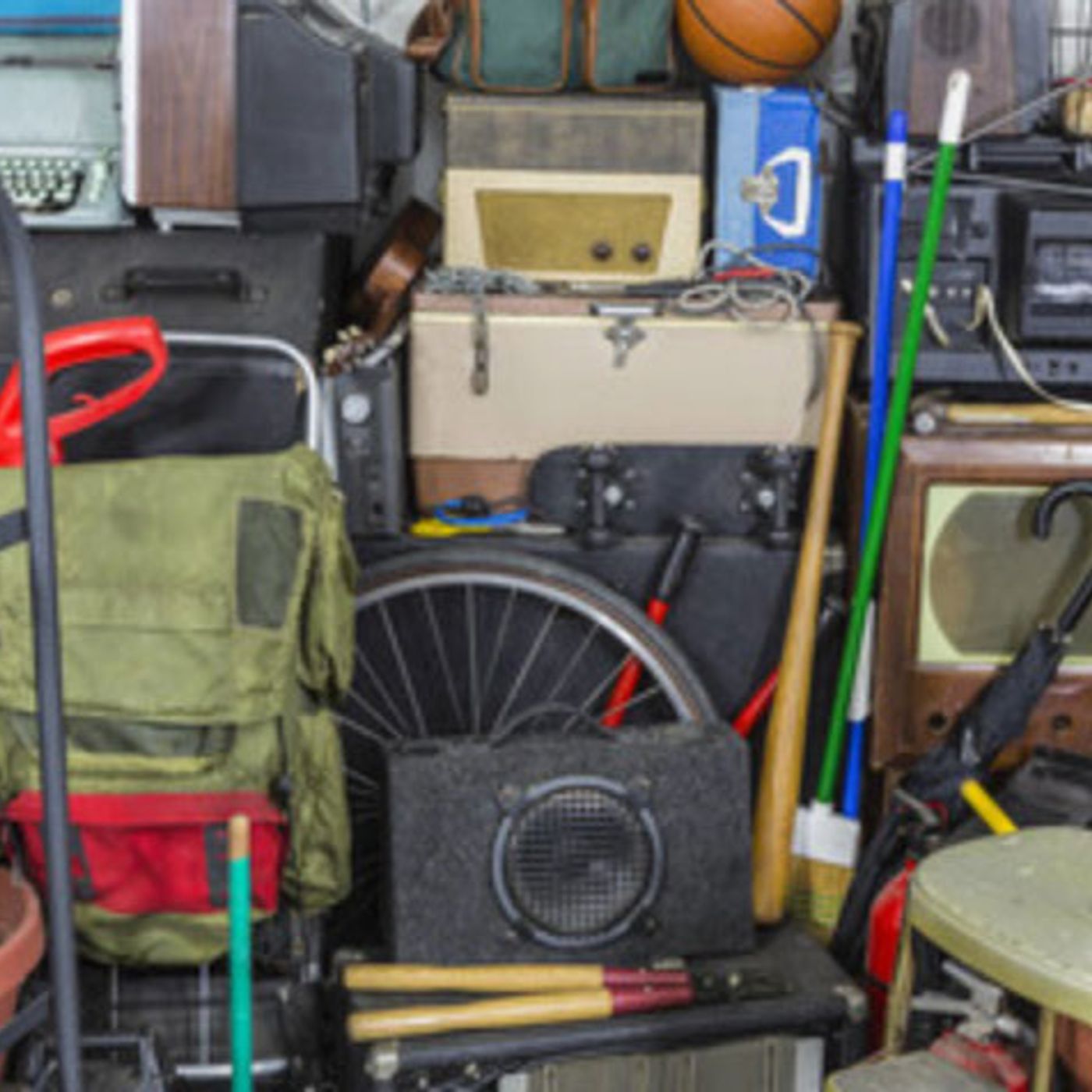
🎤 PODCAST • Hoarding ~ My mom is a black belt at hoarding crap.

www.drkenner.com Answers Your Questions
Deep Dive
Shownotes Transcript
Eric, you're dealing with your mom? Yes. Yeah? Tell me what's going on with her. Well, she's a hoarder, big time, like rooms that aren't usable. She keeps cups from fast food restaurants. I mean, just...
It's all garbage. Okay. She has a problem. How old is she? She's 56, 57. Oh, she's relatively young, so it's not necessarily Alzheimer's or some dementia. Has she been doing this for a while?
Yeah, a long time, and we've tried, and it's driving my dad nuts. And I just thought if I could do something maybe to get her to admit or go get help, it might be kind of nice. Okay, and that's a wonderful idea to do that. The question is, how do you do that? Because hoarders typically, do they want help or not? I don't think so, because I've mentioned it to her, and she just tells me there's nothing wrong with it. I'm just being a pain in the butt. Okay, can you describe your home situation?
The home she lives in, excuse me, not yours. I don't know if they were... It's just a small two-bedroom house with like an extra, we call it an Arizona room, and a garage and a storage shed. The shed, my old bedroom, the Arizona room, the living room, the dining room is all full. There's a path to the living room. The only piece of furniture that's usable in the whole building is their bed, and it's
you know, there's stuff piled up around it. What do they do for the bathroom? That is, my dad keeps that nice and clean. Okay, so there's one clean room. Dad has his zone, his territory.
Yeah, the bathroom and the garage pretty much is it. Any risk of any rats or any insects? I don't know. Because of the cups and stuff? You don't know. So it could be a health hazard, not only a physical hazard. It's a fire hazard, right, if she's got paper cups and stuff all over the place from fast food places. Tell me what else she hoards? Just paper, I mean, all kinds of stuff.
It's just unbelievable. Okay, give me just a sampling. I have paper cups, but people hoard different things. Sometimes people... Go ahead. Markers, pens, papers, boxes, empty boxes, old bows, all kinds of stuff. Okay, so basically it's a lot of crap. Yeah.
Yes, exactly. But it isn't to her. These are her possessions. These are her treasures. Do you understand the meaning behind them for your mom? Nope. You don't. But has she done it your whole life, or was there a certain time when she was a normal mom and then suddenly she started hoarding? Yeah, it's gotten worse over the years.
Okay. I think it's always been that way. Okay. There is a sheet. There is help on the horizon. Hey, I got to interrupt this because we've got to pay some bills. 30 seconds. That's it. A very quick ad and then Alan will be back. Romance. I wish I knew more about what girls want from a relationship. Well, I wish I knew more about what I want. Where's that ad I saw? Here it is. The Selfish Path to Romance. A Serious Romance Guidebook.
Download Chapter 1 for free at SelfishRomance.com and buy it at Amazon.com. Huh. The selfish path to romance. That is interesting. Okay. I think it's always been that way. Okay. There is help on the horizon. There's a book called Buried in Treasures.
And it's a cognitive behavioral therapy book by Gail Skekete, S-K-E-K-E-T-E-E. I think that's how you, S-K, no, excuse me, S-T-E-K-E-T-E-E.
Okay. And that would be a help. There are programs available. There are actually support groups. I live in Rhode Island. There's a support group at our local hospital. I went to one of their meetings on hoarding. And they have support groups for people. They actually have therapists that go into the homes and help clean them out. One of the cardinal rules is if you try to force the person who's hoarding, you are going to make therapy so much harder. If you...
They resist any attempts to just clean things up or accusing them or arguing with them or yelling at them. That typically backfires. Has your dad tried that or have you tried that?
No, not really. We try to be as nice as possible, but it's getting to the point where there's no more nice. It's got to get, something's got to be done. Well, another thing is you can declare it a health hazard and then she has no choice. For example, if a landlord can give them an ultimatum, if, you know, if it's that sort of a situation, you said you're in, she's in an apartment. Was it an apartment you said?
No, it's a house. Oh, a house. Okay, I'm sorry. You said an Arizona room, and I'm not familiar with those. And typically hoarders collect gradually. There are different types of people who focus more on acquiring things. I know we have a family member who just buys and buys and buys and buys and buys. Other people just hold on to things, and they can't discard them. It's not that they actively go out there and buy things, right?
But they can't discard them. She does both. She does both. And it makes a total mess. You can have a doctor step in and possibly tell her to look at the things in the house, but she needs a path. She needs to clear around her bed as a safety thing.
Maybe a medical doctor she might listen to. But if you get the book from Buried in Treasures, I think that will help you. And there are also some websites that you can go to. It's an anxiety disorder. That's what it's considered. You could go to the Obsessive Compulsive Foundation at ocfoundation.org.
And you'll find the book buried in treasures there.
I mean, you can just Google it and it will give you some ideas too. But sometimes you can even have the fire, you can just say, Mom, let's do this. Let's make sure it's still safe. And maybe we can just call in the fire department and let them tell us what's okay to keep and what's not. And, you know, or what, how to make it safer. And the thing is, the goal in managing it is to get her to throw the things away.
And I have seen...
pictures of the homes where the therapists have gone in and the therapists have used a non-judgmental approach and they have helped people remove things from their home to get rid of it. But they have to challenge the ideas that are making these possessions so valuable to them. Whatever obsessive compulsive ideas they have that they have to hold on to these things and acquire more, that's what they need to challenge. They have to get to the core ideas and you and I don't know what's in your mom's head. So that's where cognitive therapy comes in.
Okay. Okay. So thank you very much, and I wish you a clean home for your mom. Here's an excerpt from The Selfish Path to Romance, the Serious Romance Guidebook by clinical psychologist Dr. Ellen Kemp. And here's a little more from Dr. Kenner. Where do you live? I told you, with my mother. Well, where does she live? 129th Street in Brock. All right, I'll take you to the subway. I tell you, Will, you'll buy me a cab.
Why do all you dames have to live in the Bronx? You mean you bring other girls up here? Certainly not. I'm a happily married man. And that's from the movie The Apartment. And certainly not, I'm a happily married man, but he's bringing other girls up there. And what does that do to his mind? What does that do to his relationship with his wife, with his relationship, let's say, with his kids? He's leading a double life. And for anyone who's had an affair...
and it hasn't been out in the open, that's what affairs typically are, they're not out in the open, they know the strain, they know the anxiety, they know the frustration of trying to live a lie.
And the lies keep growing and growing. And really, they're creating a situation of self-torture for themselves. And they're doing a lot of damage to the people around them. Lies leave trails. They leave emotional trails. And they leave physical trails. Physical trails, you have cell phone numbers. You have lipstick in the car. You have...
absences, times when you're not home in the evenings. Every Thursday night my husband's gone. They also leave the emotional scars. My husband's acting so differently and my wife's acting so differently now. And, you know, she hasn't hugged me in a long time and
It's very, very painful. So if that's what you're engaged in, you can always give me a call. We can talk about how to disentangle yourself from lies because the one thing you want to recapture is your self-esteem, your self-respect, and you have a lot of work to do after you've done some damage to it. For more Dr. Kenner podcasts, go to drkenner.com and please listen to this ad. Kenner and co-author Dr. Edwin Locke.
To become a better romantic partner, understand where emotions come from. Every emotion is caused by a specific type of subconscious evaluation or appraisal. Here are some examples. Happiness is the emotion stemming from the appraisal that you've achieved or are making progress toward your most important goals and values. For example, romantic love.
Satisfaction is a narrower, less intense form of happiness, usually stemming from gaining or holding a particular value. Love results from a highly positive evaluation of another person based on their desirable qualities. Hope stems from the appraisal that a desired value will be achieved.
You can download Chapter 1 for free by going to drkenner.com